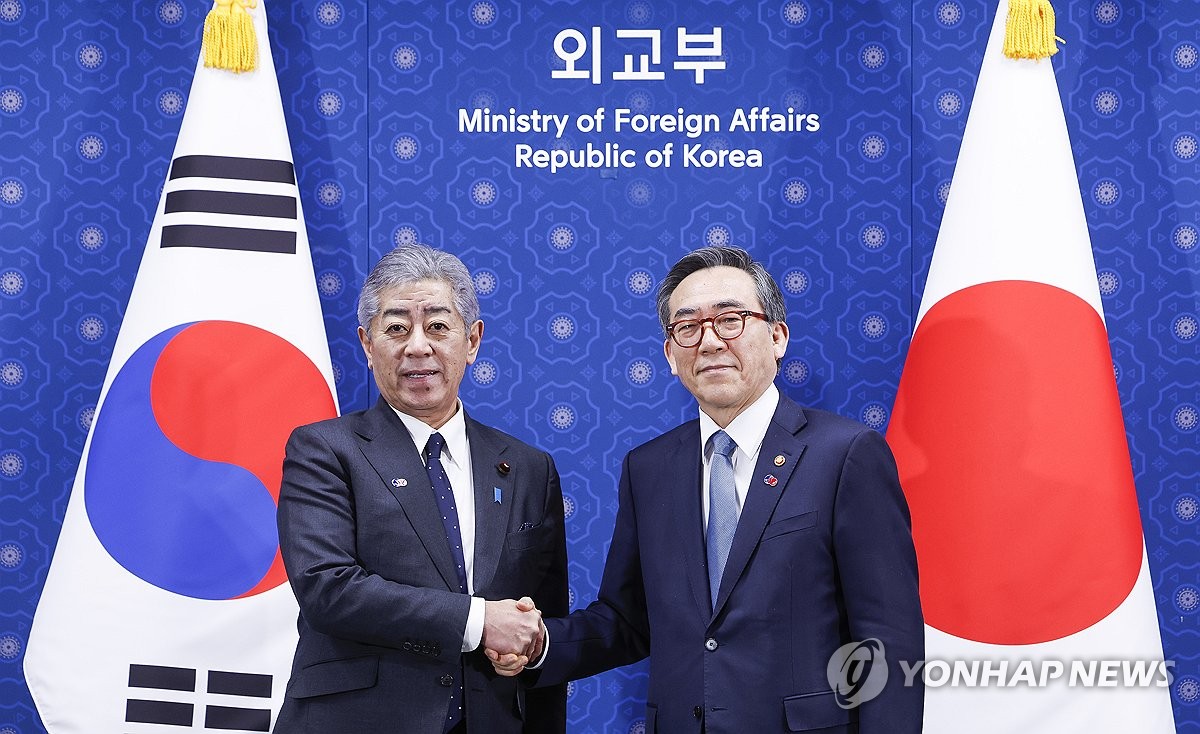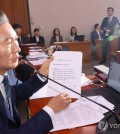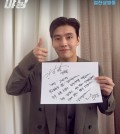- California Assembly OKs highest minimum wage in nation
- S. Korea unveils first graphic cigarette warnings
- US joins with South Korea, Japan in bid to deter North Korea
- LPGA golfer Chun In-gee finally back in action
- S. Korea won’t be top seed in final World Cup qualification round
- US men’s soccer misses 2nd straight Olympics
- US back on track in qualifying with 4-0 win over Guatemala
- High-intensity workout injuries spawn cottage industry
- CDC expands range of Zika mosquitoes into parts of Northeast
- Who knew? ‘The Walking Dead’ is helping families connect
FM Cho vows to work with Japan to reduce tensions over wartime history issues
South Korea will work closely with Japan to reduce the “amplitude” of tensions caused by longstanding wartime history issues, to ensure bilateral relations will move forward in a future-oriented manner, Seoul’s top diplomat said Monday.
Foreign Minister Cho Tae-yul made the remarks after talks with Japanese Foreign Minister Takeshi Iwaya, stressing the importance of enhancing ties with the neighbor “under any circumstances.”
“We will work closely to develop future-oriented relations (with Japan), while reducing the amplitude of tensions caused by historical issues,” Cho said at the joint press conference.
“We agreed to have sincere and honest consultations with the Japanese side to ensure that the memorial ceremony genuinely comforts the victims and becomes an event that remembers the historical significance,” Cho said.
Tensions heightened after South Korea boycotted a Japan-hosted memorial ceremony in November for Korean victims who were forced into hard labor at Japan’s Sado mine complex during World War II, following the site’s inscription on the UNESCO World Heritage list.
Seoul protested that Tokyo failed to hold the event in a way that would “sincerely” honor the victims as it had requested.
The flare-up of fresh tensions over the history sparked concerns it would negatively affect the bilateral ties that have warmed significantly under the current Yoon Suk Yeol government.
Cho also said that he delivered Seoul’s “concerns” clearly during the talks with Iwaya.
“We agreed to advance our bilateral relations unwaveringly under any circumstances,” Cho added.
Iwaya said that Japan will take steps in accordance with the pledge it made upon the site’s UNESCO listing.
At the presser, Iwaya highlighted the importance of enhancing Japan’s relations with South Korea, as well as their trilateral cooperation with the United States.
“I intend to clearly deliver to the new U.S. administration that the strategic cooperation among Japan, South Korea and the United States is more important than ever,” he said, mentioning the possibility of him attending the inauguration of U.S. President-elect Donald Trump next week.
Monday’s talks marked the first one-on-one meeting between Cho and Iwaya since South Korea became embroiled in a political crisis following President Yoon Suk Yeol’s impeachment over his short-lived martial law imposition.
While declining to comment on South Korea’s political situation, Iwaya described the two countries as “important neighbors that must cooperate as partners” in responding to various international issues.
“The importance of our bilateral relations remains unchanged,” he said.
Iwaya and Cho both expressed hope that the two countries will be able to revive the “shuttle diplomacy” between their leaders, referring to the regular visits that resumed between Yoon and former Japanese Prime Minister Fumio Kishida amid the thawing ties.

Bilateral relations between Seoul and Tokyo have significantly warmed after Yoon announced a decision In March 2023 that South Korea will compensate its victims of Japan’s wartime forced labor without contributions from responsible Japanese companies.
The two ministers said they also discussed preparations for the 60th anniversary of the normalization of diplomatic relations, holding out expectations that it will serve as additional positive momentum for the two countries’ path toward the future.
The ministers shared “grave concerns” over North Korea’s evolving nuclear and missile threats and its deepening military ties with Russia, including the North’s troop deployment to aid Moscow in its war against Ukraine.
They condemned the North’s illegal military activities and reaffirmed their commitment to close coordination to address the issues.
Following the presser, Cho hosted a dinner banquet for Iwaya and his delegation.
Ahead of meeting with Cho, Iwaya visited Seoul National Cemetery to pay his respects and met with National Assembly Speaker Woo Won-shik to discuss bilateral relations.
Iwaya’s two-day trip to Seoul marks the first visit by a Japanese foreign minister in nearly seven years. He was expected to pay a courtesy call on acting President Choi Sang-mok on Tuesday.
Iwaya is on a four-day tour this week that will also take him to the Philippines and Palau.











